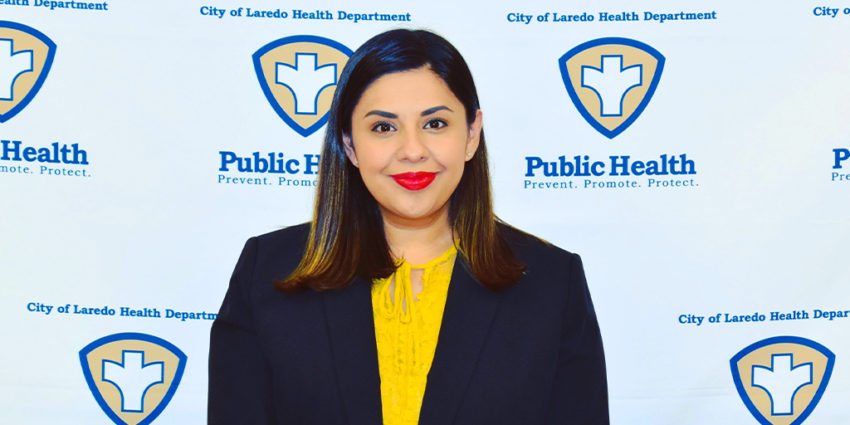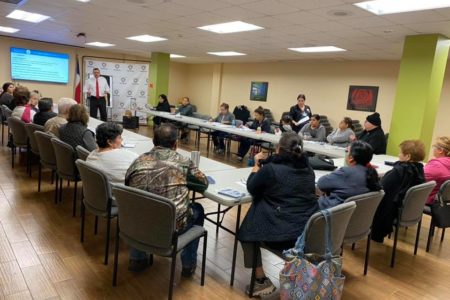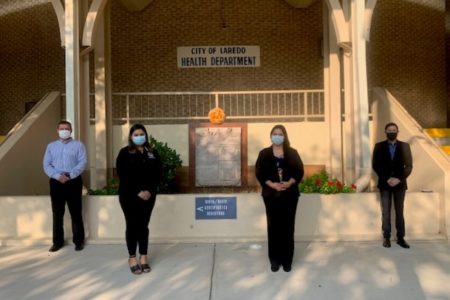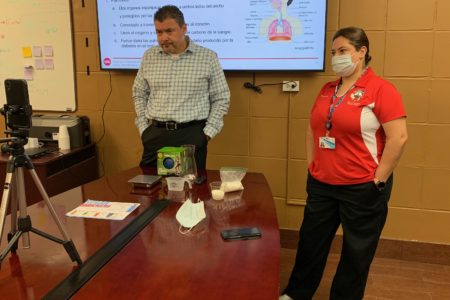
Share On Social!
Since childhood, Christina Duarte has wanted to help people.
Helping people is why she became chief of health education and promotion for the Health Department of Laredo, Texas, a predominantly Latino city on the U.S.-Mexico border.
When the coronavirus pandemic struck, Duarte immediately looked for ways to help her community, which struggled with disparities in COVID-19 case and death rates.
So Duarte shifted the city’s in-person health classes to a virtual platform to help those at home during the height of the coronavirus quarantine.
“Our participants continued to ask, ‘are you even going to have classes again? My mental health is at stake,’” she said. “Then the numbers increased. We started working on mental health preparedness here at the health department. Really, it was that impact, the negative impact, that set the tone for us. How were we going to help these people? How are we going to keep them from falling into depression or anxiety? How can we get them off that couch, you know? To be physically active, even if it’s just for two minutes.
“And so it was really just about helping people where they were at.”
Coronavirus Hits Laredo, Texas
Historically, the Laredo Health Department offers Zumba classes, nutrition classes, diabetes education classes, and more.
The classes help people manage and prevent health issues and improved overall and mental health, Duarte said.
“We hear it all the time that our residents are very happy,” she said. “They’re very thankful. They really, really benefit from [our classes] and to see how they relate to the services that we provide to them. We have that in messages, phone calls, and even on Facebook thanking us just for the vital information that we provided to them. And so the feedback has been great.”
Then the pandemic struck in March 2020.
Amid COVID-19, Latinos in Laredo and across the nation faced disproportionately higher rates of cases and death, job loss, and other inequitable impacts, such as mental health issues.
Like so many other forms of healthcare, there has been a historical lack of available mental health services in communities of color. Latinos are more likely than their peers to have mental health issues, which often go unaddressed and untreated, according to a Salud America! research review.
“People who were supporting themselves on some level now can’t,” Cathi Tillman, the executive director and founder of La Puerta Abierta — a Philadelphia nonprofit providing mental health support to immigrant and refugee communities, told the Philadelphia Inquirer. “They’ve lost their jobs. They can’t congregate socially or go to church, which is a big part of the community for many people. They can’t come into the office for therapy. For recent immigrants and refugees, the things that were already difficult are 100% more difficult now.”
Laredo went into lockdown to prevent the spread of coronavirus. Most residents stayed in their homes and kept trips at a minimum.
In-person health classes were no longer a feasible option.
How could Duarte and the Laredo Health Department their community now?
Virtually Helping the Laredo Community Amid COVID-19
The pandemic forced the Laredo Health Department to rethink its strategies, according to Duarte.
“We decided that we were going to move to a virtual platform to continue to have our community residents improve their health. So we wanted to find a way to encourage them at home. We knew that these individuals were at home in quarantine — isolated. We knew that their mental health was at stake. So, we thought of an innovative way to post these classes virtually. And so we moved to the platform of Facebook.”
 The group also explored other options, such as providing services via WebEx and Zoom.
The group also explored other options, such as providing services via WebEx and Zoom.
“We knew it was best to go virtual to protect our community,” Duarte said. “We knew that hosting our classes virtually would give our members the accessibility to connect from anywhere. We explored all social media platforms — Facebook, Twitter, Instagram.”
Laredo Health’s Nutritionists and program coordinators are currently offering the Diabetes Empowerment Education Program and the CDC Diabetes Prevention Programs. These occur once a week via Webex, according to Duarte.
“Our physical activity classes are being held via Zoom,” she said. “Our classes are offered 3x a week (mornings, evenings, and weekends). Participation has been steadily increasing within our virtual classes. Additionally, Our health education team creates and disseminates information via our social media platforms. We provide the community with health education infographics, PSAs, and flyers. We recently implemented a series of weekly discussions on Mental Health support.”
Through Facebook, the city’s health classes soared in popularity. They even doubled their number of Facebook followers in just three months.
“We reached many, many families or individuals in their home,” Duarte said.
More than that, these public health workers wanted to reach those who needed the most help.
“When we talk about diabetes, it is not just about one person,” Homero Cantu, a nutritionist with Laredo Health, said. “Diabetes is part of the family. You need to work [at managing the disease] together. For example, if a father [has diabetes], his son is might start having problems with that in the future. That’s why you have to start right now. It is not only with but you with all your family.”
For Duarte, this has been a life-long pursuit.
Growing Up, Hoping to Help
For Duarte, helping people better their lives came from her childhood and her experiences as an adult.
“My passion was driven by the obstacles that came along the way,” Duarte said. “You know, from, being a teen parent, financial aid, etcetera.”
Still, those hardships lead her to pursue a career in helping others, from crisis intervention to working as a social service caseworker.
“I was a crisis intervention worker,” she said. “So, basically, what I did was, for hospitalizations for children from age 3 to 17 — those with psychiatric health issues, psychiatric health, emergency/mental health issues, went to VCFS, which is a program for expectant mothers we work with, low income. Expectant mothers here in Laredo and in the surrounding area.”
Duarte moved on to the Laredo Health Department in 2016, where she leads the community outreach programs. 
How You Can Help Too
For Duarte and her colleagues, including Daniela Perez, a healthy living coordinator with Laredo Health, helping others remains the driving force behind her work.
“I love the interaction with people,” she said. “My main satisfaction is making our participants comfortable and them actually seeing results of their hard work. I am passionate about healthy living, education, and caring for others, but improving the lives of patients is my favorite job.”
You can get involved, too.
First, beware of COVID-19 pandemic fatigue.
Second, check out the Salud America! “Juntos, We Can Stop COVID-19” bilingual communication campaign to help Latino families take action to slow the spread.
Third, download the free Salud America! “Get Your City to Declare Racism a Public Health Crisis Action Pack”!
The Action Pack will help you gain feedback from local social justice groups and advocates of color. It will also help you start a conversation with city leaders for a resolution to declare racism a public health issue, along with a commitment to take action to change policies and practices. It will also help build local support.
Dr. Amelie G. Ramirez, director of Salud America! at UT Health San Antonio, created this Action Pack with input from several San Antonio-area social justice advocates.
Explore More:
Healthcare AccessBy The Numbers
25.1
percent
of Latinos remain without health insurance coverage
This success story was produced by Salud America! with support from the Robert Wood Johnson Foundation.
The stories are intended for educational and informative purposes. References to specific policymakers, individuals, schools, policies, or companies have been included solely to advance these purposes and do not constitute an endorsement, sponsorship, or recommendation. Stories are based on and told by real community members and are the opinions and views of the individuals whose stories are told. Organization and activities described were not supported by Salud America! or the Robert Wood Johnson Foundation and do not necessarily represent the views of Salud America! or the Robert Wood Johnson Foundation.



